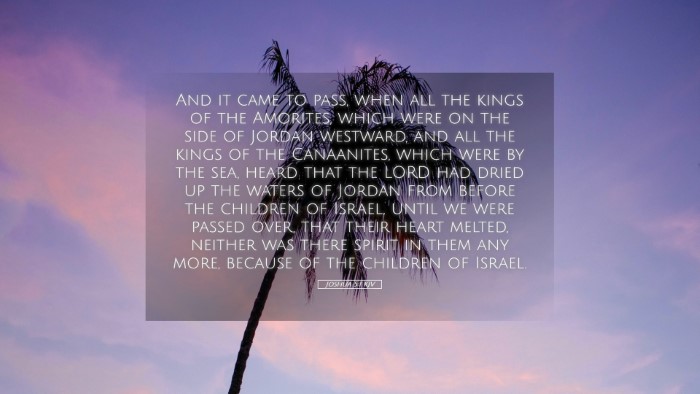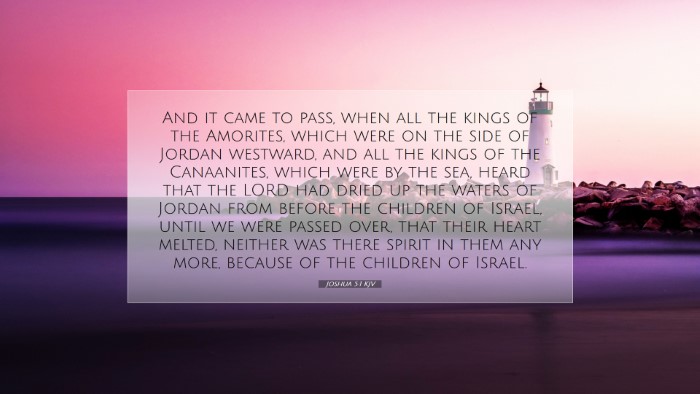Old Testament
Genesis Exodus Leviticus Numbers Deuteronomy Joshua Judges Ruth 1 Samuel 2 Samuel 1 Kings 2 Kings 1 Chronicles 2 Chronicles Ezra Nehemiah Esther Job Psalms Proverbs Ecclesiastes Song of Solomon Isaiah Jeremiah Lamentations Ezekiel Daniel Hosea Joel Amos Obadiah Jonah Micah Nahum Habakkuk Zephaniah Haggai Zechariah MalachiJoshua 5:1
Joshua 5:1 KJV
And it came to pass, when all the kings of the Amorites, which were on the side of Jordan westward, and all the kings of the Canaanites, which were by the sea, heard that the LORD had dried up the waters of Jordan from before the children of Israel, until we were passed over, that their heart melted, neither was there spirit in them any more, because of the children of Israel.
Joshua 5:1 Bible Commentary
Commentary on Joshua 5:1
Verse: Joshua 5:1
"And it came to pass, when all the kings of the Amorites, which were on the side of Jordan westward, and all the kings of the Canaanites, which were by the sea, heard that the LORD had dried up the waters of Jordan from before the children of Israel, until we were passed over, that their heart melted, neither was there spirit in them any more, because of the children of Israel."
Introduction
Joshua 5:1 sits at a pivotal point in the narrative of the Israelite conquest of Canaan. Here, we witness the psychological and spiritual impact of divine intervention as Israel enters the Promised Land. This verse provides vital context as it reveals the reactions of the surrounding nations upon witnessing God's mighty works.
Historical Context
The backdrop of this verse is the miraculous crossing of the Jordan River. The Israelite people, having wandered in the desert for forty years, have now been delivered into the land promised to them. The mention of the Amorite and Canaanite kings indicates that Israel's divine favor has provoked fear among their adversaries.
Insights from Public Domain Commentaries
Matthew Henry's Commentary
Matthew Henry emphasizes the spiritual significance of the events leading to this verse. He observes that the drying up of the Jordan is not merely a physical miracle but a demonstration of God’s power and faithfulness. Henry writes:
"The victories of the Church are accomplished not by might or human wisdom but by the Spirit of the Lord.”
The fear instilled in the kings of the Amorites and Canaanites should remind believers of the omnipotence of God. Their reaction is a testament to the fear that accompanies divine grace extended to His chosen people.
Albert Barnes' Notes on the Bible
Barnes provides a more detailed exploration of the geographical implications of the verse. He notes that the strategic positioning of Israel, having crossed the Jordan, places them in a decisive position for conquest. Barnes points out:
"The dread which seized the inhabitants of Canaan was not merely based on the crossing of the Jordan but reflected their awareness of the continuous acts of God on behalf of Israel.”
This acknowledgment serves to highlight the faithfulness of God in fulfilling His promises. The narrative transitions from the Israelites’ journey towards conquest to the trepidation of their adversaries.
Adam Clarke's Commentary
Adam Clarke adds a nuanced perspective by discussing the cultural and ethical implications of the Israelites’ success. He interprets the melting of hearts among the Canaanites as indicative of a deeper realization of their impending defeat — a judgment from God for their iniquities:
"The kings’ fear was just; they knew the iniquity of their practices and the consequent divine retribution.”
Clarke's interpretation invites readers to consider not only the external circumstances but also the moral and spiritual implications of Israel’s conquest. It serves as a precursor to understanding the broader themes of judgment, mercy, and divine sovereignty.
Theological Reflections
- God's Sovereignty: This verse underscores the sovereignty of God in human affairs. The fear of the Canaanite kings illustrates the fulfillment of God’s promises and the inevitability of His plans.
- Fear as a Motivator: The reaction of the nations reflects a profound biblical theme: the fear of God often precedes action. Their fear implies the recognition of Israel as God’s instrument of judgment.
- Preparation for Conquest: This verse sets the stage for the major battles to come. Understanding the fear of adversaries is crucial for comprehending the dynamics of spiritual warfare that Israel faces.
Application for Believers
Joshua 5:1 serves as a powerful reminder to contemporary believers of God’s active role in the history of redemption. By reflecting on this verse, pastors, students, and theologians can draw several applicational insights:
- Embrace Fearlessness: Just as the Canaanites were filled with fear at the sight of God’s power, believers should cultivate a fearlessness grounded in their identity as God’s chosen people.
- Trust in Divine Intervention: The miraculous crossing of the Jordan encourages believers to trust in God’s provision even in seemingly impossible situations.
- Recognize the Consequences of Iniquity: The text serves as a stern reminder that societal iniquity invites judgment, urging believers to pursue holiness and justice.
Conclusion
Joshua 5:1 encapsulates a crucial moment in Israel’s history, filled with both promise and foreboding. Through a synthesis of insights from notable commentaries, we gain a deeper understanding of God’s sovereignty, the nature of fear, and the significance of holiness. This verse challenges believers not only to understand the actions of God in history but to apply these truths to their lives with courage and faith.


